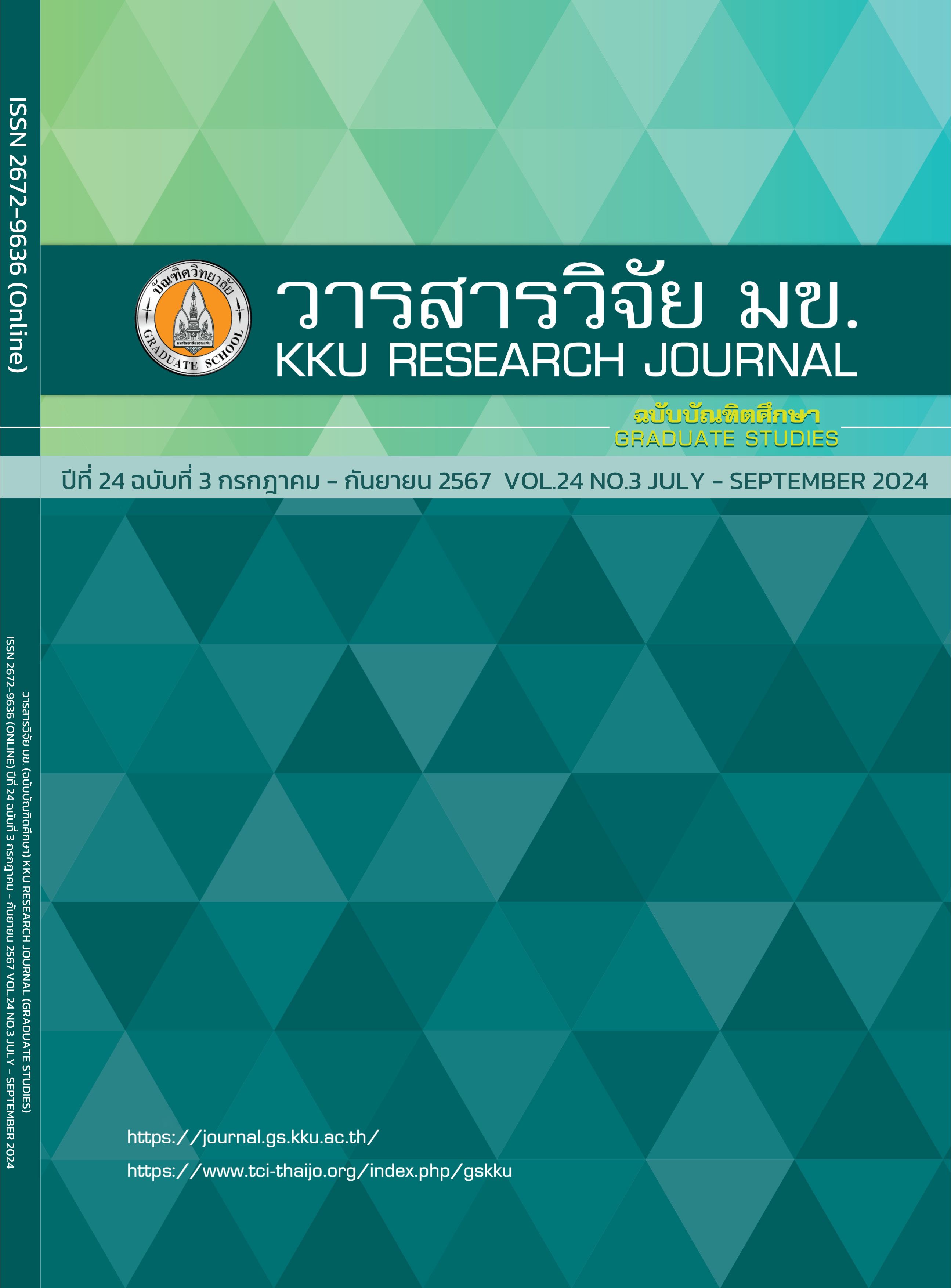การพัฒนาและตรวจสอบคุณภาพเครื่องมือประเมินความรู้การใช้ยาต้านการแข็งตัวของเลือดชนิดรับประทานกลุ่มใหม่ในผู้ป่วยภาวะหัวใจห้องบนสั่นพลิ้ว
คำสำคัญ:
ยาต้านการแข็งตัวของเลือดกลุ่มใหม่ชนิดรับประทาน ความรู้ของผู้ป่วย การพัฒนาเครื่องมือประเมินความรู้บทคัดย่อ
การวิจัยนี้มีวัตถุประสงค์เพื่อพัฒนาและตรวจสอบเครื่องมือเพื่อประเมินความรู้ของผู้ป่วยภาวะหัวใจห้องบนสั่นพลิ้ว (Atrial fibrillation; AF) ในการใช้ยาต้านการแข็งตัวของเลือดชนิดรับประทานกลุ่ม new oral anticoagulants (NOACs) งานวิจัยแบ่งออกเป็น 2 ขั้นตอน ได้แก่ ขั้นตอนที่ 1 เป็นการพัฒนาแบบประเมินความรู้การใช้ยา NOACs ในผู้ป่วย AF และขั้นตอนที่ 2 เป็นการตรวจสอบคุณภาพแบบประเมิน ในด้านความตรงเชิงเนื้อหาในผู้เชี่ยวชาญจำนวน 6 ท่าน และประเมินความเที่ยงและความยากของแบบประเมินในผู้ป่วยจำนวน 30 ราย แบบประเมินความรู้ที่พัฒนาขึ้นเป็นคำถามแบบปรนัย 3 ตัวเลือก ประกอบด้วยข้อคำถามจำนวน 23 ข้อ แบ่งคำถามออกเป็น 6 มิติ ได้แก่ มิติที่ 1 ความรู้เบื้องต้นเกี่ยวกับยา มิติที่ 2 อาการไม่พึงประสงค์จากการใช้ยา มิติที่ 3 การบริหารยา มิติที่ 4 อันตรกิริยาที่อาจเกิดขึ้นเมื่อใช้ยากลุ่ม NOACs ร่วมกับยาอื่น มิติที่ 5 การติดตามผลตรวจทางห้องปฏิบัติการ และมิติที่ 6 การดูแลตนเองเบื้องต้นและการใช้ชีวิตประจำวันของผู้ป่วย ผลการตรวจสอบความตรงเชิงเนื้อหาจากผู้ทรงคุณวุฒิได้ค่าดัชนีความตรงตามเนื้อหาทั้งฉบับ 0.97 ผลการประเมินความเที่ยงและความยากของเครื่องมือในกลุ่มตัวอย่างผู้ป่วยพบว่า แบบประเมินมีค่าความเที่ยง 0.95 และค่าเฉลี่ยความยากของคำถามแต่ละมิติอยู่ในช่วง 0.22-0.96 เครื่องมือประเมินความรู้การใช้ยาต้านการแข็งตัวของเลือดกลุ่มใหม่ในผู้ป่วย AF ที่พัฒนาขึ้นในการศึกษานี้ ผ่านมาตรฐานการตรวจสอบคุณภาพของเครื่องมือในด้านความตรงเชิงเนื้อหาและความเที่ยงของเครื่องมือ ดังนั้นจึงสามารถนำเครื่องมือไปประเมินความรู้ในผู้ป่วย AF เพื่อใช้เป็นแนวทางในการให้ความรู้และคำปรึกษาแก่ผู้ป่วยได้อย่างเป็นระบบ
เอกสารอ้างอิง
Albertsen IE, Rasmussen LH, Overvad TF, Graungaard T, Larsen TB, Lip GY. Risk of stroke or systemic embolism in atrial fibrillation patients treated with warfarin: a systematic review and meta-analysis. Stroke. 2013; 44(5): 1329-1336.
Hindricks G, Potpara T, Kirchhof P, Kühne M, Ahlsson A, Balsam P, et al. ESC Guidelines for the diagnosis and management of atrial fibrillation developed in collaboration with the European Association for Cardio-Thoracic Surgery (EACTS). European heart journal. 2021; 42(5): 373-498.
Suwanwela NC, Chutinet A, Autjimanon H, Ounahachok T, Decha-umphai C, Chockchai S, et al. Atrial fibrillation prevalence and risk profile from novel community-based screening in Thailand: A prospective multi-centre study. IJC Heart & Vasculature [Online] 2021; 32(2): 1-7. Available from: https://doi.org/10.1016/j.ijcha.2020.100709
Al-Momany NH, Makahleh ZM, Al-Omari NA, Al-Sarayreh HA, Momani RO. Analysis of Factors That Interrupt With INR Control in the First Anticoagulation Clinic Monitoring Jordanian Patients. Clinical and Applied Thrombosis/Hemostasis [Online] 2019; 25(8): 1-9. Available from: https://doi.org/10.1177/1076029619870252
Ansell J, Hirsh J, Hylek E, Jacobson A, Crowther M, Palareti G. Pharmacology and Management of the Vitamin K Antagonists American College of Chest Physicians Evidence-Based Clinical Practice Guidelines (8th Edition). Chest. 2008; 133(6): 160-198.
Ruff CT, Giugliano RP, Braunwald E, Hoffman EB, Deenadayalu N, Ezekowitz MD, et al. Comparison of the efficacy and safety of new oral anticoagulants with warfarin in patients with atrial fibrillation: A meta-analysis of randomised trials. The Lancet. 2014; 383(3): 955-962.
Viola R, Fekete H, Csoka I. Patients’ knowledge on oral anticoagulant treatment in Hungary. International journal of clinical pharmacy. 2017; 39(6): 1265-1272.
Davis NJ, Billett HH, Cohen HW, Arnsten JH. Impact of adherence, knowledge, and quality of life on anticoagulation control. Annals of Pharmacotherapy. 2005; 39(4): 632-636.
Hernández Madrid A, Potpara TS, Dagres N, Chen J, Larsen TB, Estner H, et al. Differences in attitude, education, and knowledge about oral anticoagulation therapy among patients with atrial fibrillation inEurope: result of a self-assessment patient survey conducted by the European Heart Rhythm Association. EP Europace. 2016; 18(3): 463-467.
Calvin H, Kerstin H, Jeffrey I. Overview of the new oral anticoagulants: opportunities and
challenges. Arteriosclerosis, thrombosis, and vascular biology. 2015; 35(5): 1056–1065.
Loharattanakong P, Ritthiboon P, Hongrinya Y, Chaichun M, Taksinachanekij S, Uchaipichat V. Warfarin using knowledge and international normalized ratio goal control in outpatients of Queen
Sirikit Heart Center of the Northeast. Srinagarind Medical Journal. 2016; 31(3): 257-265.
Udomdachanut P, Wongruttanachai A, Sakunrag I. Development of the Warfarin Knowledge Test in Patients Receiving Warfarin at Pathumthani Hospital. Srinagarind Medical Journal. 2020; 35(3): 272-277.
Metaxas C, Albert V, Stahl M, Hersberger KE, Arnet I. Development and validation of a questionnaire to self-assess patient knowledge of direct oral anticoagulants (KODOA-test). Drug, healthcare and patient safety. 2018; 10(12): 69-77.
Obamiro KO, Chalmers L, Bereznicki LR. Development and validation of an oral anticoagulation knowledge tool (AKT). PLOS One [Online] 2016; 11(6): 1-10 Available from: https://doi.org/10.1371%2Fjournal.pone.0158071
Briggs AL, Jackson TR, Bruce S, Shapiro NL. The development and performance validation of a tool to assess patient anticoagulation knowledge. Research in social and administrative Pharmacy. 2005; 1(1):40-59.
Zeolla MM, Brodeur MR, Dominelli A, Haines ST, Allie ND. Development and validation of an instrument to determine patient knowledge: the oral anticoagulation knowledge test. Annals of Pharmacotherapy. 2006; 40(4): 633-638.
Polit DF, Beck CT. The content validity index: are you sure you know what’s being reported? critique and recommendations. Research in nursing & health. 2006; 29(5): 489-497.
Chaichanawirote U, Vantum C. Evaluation of content validity for research instrument. Journal of Nursing and Health Sciences. 2017; 11(2): 105-111.
Pasunon P. Reliability of questionnaire in quantitative research. Parichart Journal. 2014; 27(1): 145-163. Thai.
ดาวน์โหลด
เผยแพร่แล้ว
ฉบับ
ประเภทบทความ
สัญญาอนุญาต
ลิขสิทธิ์ (c) 2024 วารสารวิจัย มข. (ฉบับบัณฑิตศึกษา)

อนุญาตภายใต้เงื่อนไข Creative Commons Attribution-NonCommercial-NoDerivatives 4.0 International License.



